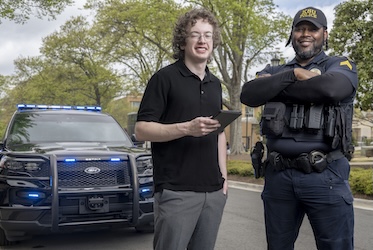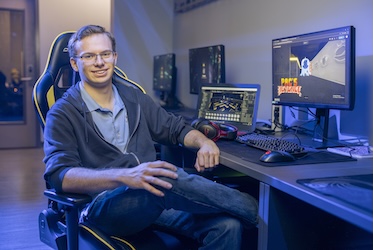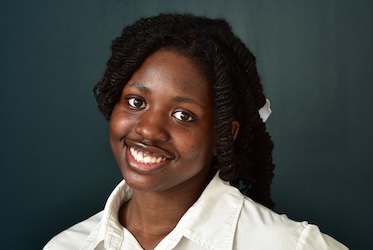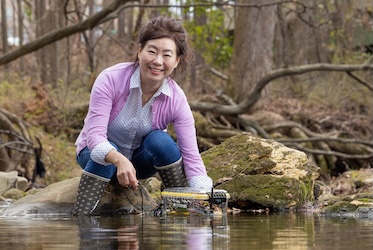
Software engineering graduate gains experience from KSU communities
KENNESAW, Ga. | May 7, 2020
For thousands of Kennesaw State students each semester, graduation represents a defining moment. It is an opportunity to reflect on their entire educational journey - the mentors they found, the friendships they made and the opportunities they seized. In recognition of that, we are spotlighting students who are completing their final semester at KSU. Elisabeth Petit-Bois, who is earning a degree in software engineering, shares in her own words what made KSU the perfect fit.

At the time, I was no stranger to KSU. I had two sisters who had come before me: a computer engineer and a software engineer. Not only did KSU host my sisters, but it also hosted the only undergraduate software engineering program in the state of Georgia. I was sold.
Freshman Year
Sitting in my first programming class, I tried to soak it all in: variables, for-loops, and, of course, the iconic “Hello World” program. As classes became more difficult, projects became more complex and professors became stricter. Clearly, getting accepted to college was only half of the work. I still had many goals and aspirations I could not yet put into words. All I knew was I wanted to work on products that would revolutionize how humans interacted with tech; however, there are many routes to take in software engineering. As a freshman, it was all very overwhelming and challenging deciding what to ultimately pursue.
Getting Involved
Despite the rigorous semesters, I tried to stay busy to take in as much of the college experience as I could. KSU offers countless opportunities in mentoring, clubs, student activities and professional growth. In my busiest semesters, I found myself working as a web assistant with the UITS’ WebGroup, mentoring incoming CCSE (College of Computing and Software Engineering) freshmen, volunteering at nearby STEM high schools, and managing to find enough time to squeeze in a run or racquetball session at the end of the day. There was never a dull moment.
By far, most of my growth came from the communities on campus. Clubs like the Louis Stokes Alliance for Minority Participation (LSAMP) and the National Society of Black Engineers (NSBE) helped shape and encourage my academic, professional and personal growth tremendously. Through these organizations, not only was I able to establish long-lasting connections and volunteer in my community, but I also managed to land two summer internships with the U.S. Department of Energy and Macy’s Technology my freshman and sophomore year.
Hands-on Learning
When I finished my second internship, I decided I wanted to do something different. I wanted to solve unsolved problems. This curiosity led me to look up the research interests of professors at my college and give research a chance. The professors I reached out to were very encouraging. In the end, Dr. Chih-Cheng Hung allowed me to perform undergraduate research with him in the Center for Machine Vision and Security Research, constantly urging me to apply to opportunities I never thought I could obtain. Since my introduction to undergraduate research, I have found a newfound love for computing, particularly when it comes to human-computer interaction (HCI) and artificial intelligence (AI).
After discovering my passion, doors started to open. In 2018, I worked at IBM Research AI alongside industry researchers trying to formulate a much more accurate method of using transfer learning in image classification. In summer 2019, I worked at CERN, one of the most respected research labs in the world. While there, I spent nine weeks working on bridging the gap between their disconnected cloud computing platforms so that users can more easily access their data from one endpoint, thereby improving user experience for more than 12,000 users around the globe. Finally, in fall 2019, I wrapped up a fall internship at LinkedIn, working on a way to retain users on their Jobs Home page. Daily, I worked on production-level code to ensure LinkedIn’s millions of users are served delightful, new experiences on the web. In their own way, these internships offered skills directly related to enhancing user experience and artificial intelligence, further cementing my desire to pursue graduate studies in this area.
Plans After Graduation
After graduating in May, I plan to attend graduate school. My experiences at KSU have fueled my desire to learn more about the strict logic of AI and creativity of HCI in order to introduce opportunities for humans to better interact with technology. AI and HCI could not be more different; however, together, their applications are excitingly numerous. The same feeling that urged me to declare “software engineering” as my major when applying for my undergraduate degree continues to motivate me to pursue greater heights in my education and future career than I could have ever imagined as a child.
– Travis Highfield
Photos by David Caselli
Related Stories

Kennesaw State student develops AI tools to help first responders diagnose behavioral health issues

Kennesaw State computer game design student launches studio, first video game

Kennesaw State student integrates artificial intelligence into architectural design education

KSU researcher designing AI system to transform water safety
A leader in innovative teaching and learning, Kennesaw State University offers undergraduate, graduate, and doctoral degrees to its more than 47,000 students. Kennesaw State is a member of the University System of Georgia with 11 academic colleges. The university’s vibrant campus culture, diverse population, strong global ties, and entrepreneurial spirit draw students from throughout the country and the world. Kennesaw State is a Carnegie-designated doctoral research institution (R2), placing it among an elite group of only 8 percent of U.S. colleges and universities with an R1 or R2 status. For more information, visit kennesaw.edu.















